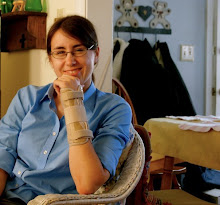I'm sure at least some of you have seen the TV show "How I Met Your Mother." There's an episode in the first season where two characters, Ted and Marshall, are arguing about who gets the apartment when Marshall gets married, and the fight comes down to an old-fashioned duel. Yes, with swords.
During the duel, the episode flashes back to another time when Ted and Marshall sat down to discuss the apartment problem-- but they decided that it was a problem for Future Ted and Future Marshall. Watch the episode to find out the results-- suffice to say, someone got the point of it a little too well.
Even though students can be an energized bunch, sometimes we fall into the habit of thinking social justice problems are things for “Future Me” to deal with. It can be hard to make us believe that these are real concerns that will impact our lives.
I will say that I have been fortunate in my time at American University to come into contact with a lot of people who care about working for social justice, few more so than the United Methodist Student Association. We emphasize hospitality, community, and social justice-- three things we consider interconnected topics.
It's that unified view that, in my opinion, makes us unique. I think that that is a very important way to look at the nature of social justice. If we have that sense that we are all part of a community, whether it be a university, a city, or a country, then why wouldn't we want to be hospitable in the broadest sense of the term? Why wouldn't we work for justice for all?
In the UMSA, our social justice program is called The Other Six Days-- as in, we know what you're doing on Sunday, but what are you doing the other six days? We focus on education, though we often combine service as well. Because there are so many issues to be concerned about, we discuss a different topic each month of the school year. These have included the gender gap, LGBT rights, disaster relief, disability rights, and more.
We as students all find our own ways of getting involved in social justice work. One common way to do so is via unpaid internships, often at NGOs. For instance, I spent a semester working at a Catholic social justice advocacy group, whose slogan (meaningfully) was Challenging Structures, Changing Lives.
Other times, opportunities for students to engage drop into our laps and demand that we seize the moment-- most recently, when Westboro Baptist Church protested at American University. Campus groups organized a large counter-protest to express our commitment to tolerance and acceptance. I suspect the university administration may have preferred that we ignore WBC and avoid attention, but that was not going to happen-- we were way too fired up, and we pulled the administration on board.
There are great reasons for students to engage in advocacy work. For one, we're all so addicted to technology that we're shocked when there's something that we can't do online. For another, as Regina says, we're all patients in the end-- and a good many of us are patients throughout our lives too. Just as important, though, social justice problems shouldn't be left for "Future Me" to handle. We're here now too, after all.
